
The Chinese word for fortune teller means “one who counts life.” In traditional East Asian cultures, the ability to tell fortunes is viewed as a gift—a way to help people make an accounting of life, interpret the past, and make good decisions about the future.
A Taiwanese friend of mine recently explained that she once visited a fortune teller because her father was so sick that she was afraid he was going to die. She went to a coworker who was known for fortune telling to ask if her father would get better. “He seemed to know so much about my family that I had never told him before,” she said, “and he told me that my father would not die as long as I prayed to certain idols and performed some religious rituals. I did what he said, and my dad did get better.”
Still, she didn’t find spiritual peace. She confessed that she felt scared at night when she prayed to the idols. And even after her dad got better, she felt alone.
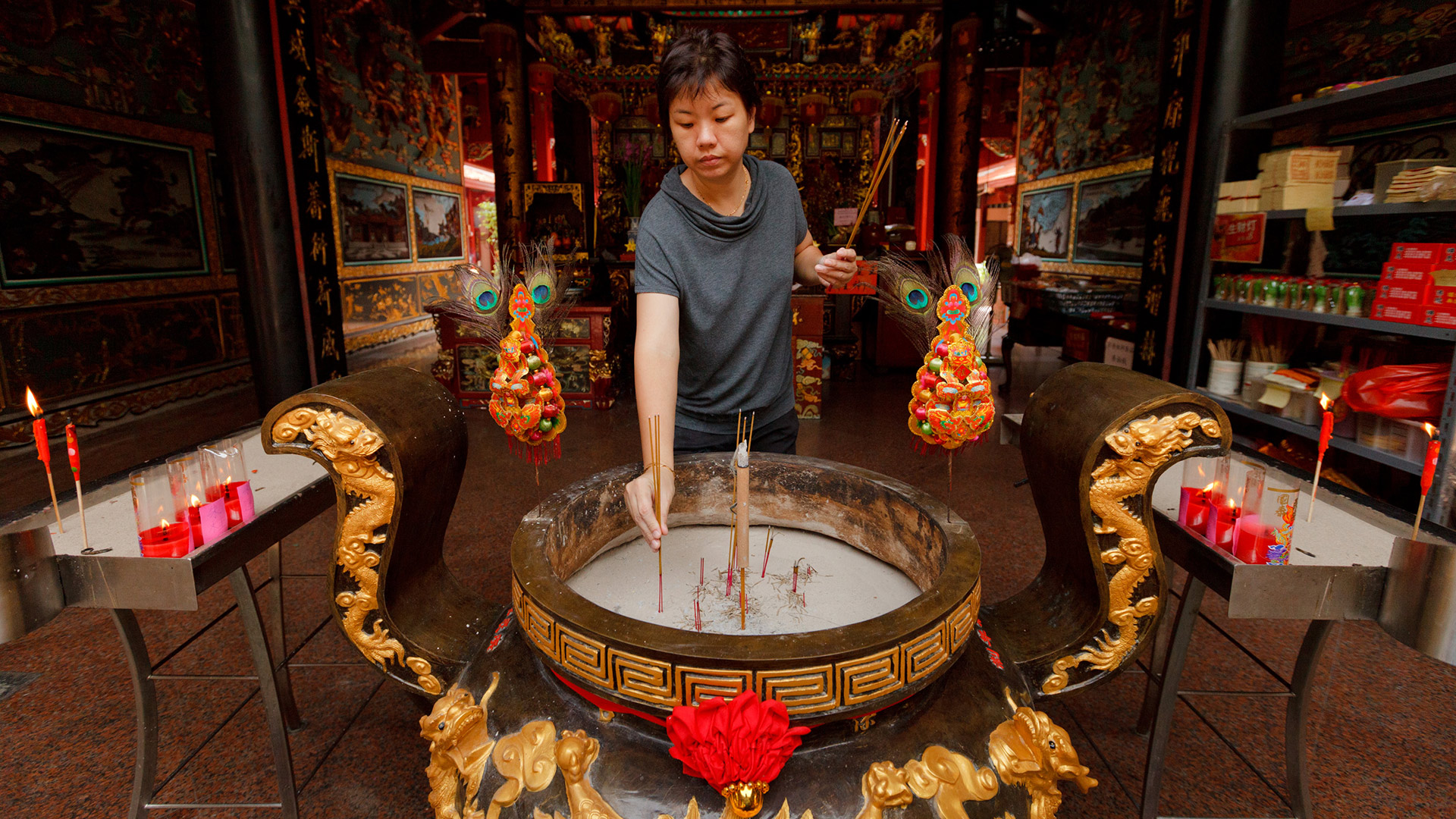
A woman lights incense in a Chinese Buddhist temple in Singapore, another East Asian megacity. All photos in this gallery were taken by Hugh Johnson.
Fortune Telling: A Popular Remedy for Fear
Like so many Taiwanese people, a time of uncertainty and fear led my friend to seek spiritual help through fortune telling. Although East Asian society may appear modern and westernized on the surface, ancient and deeply held beliefs about divination are still common. For centuries, people from many religious traditions, including Buddhism, Daoism, and folk religion, have engaged in fortune telling.
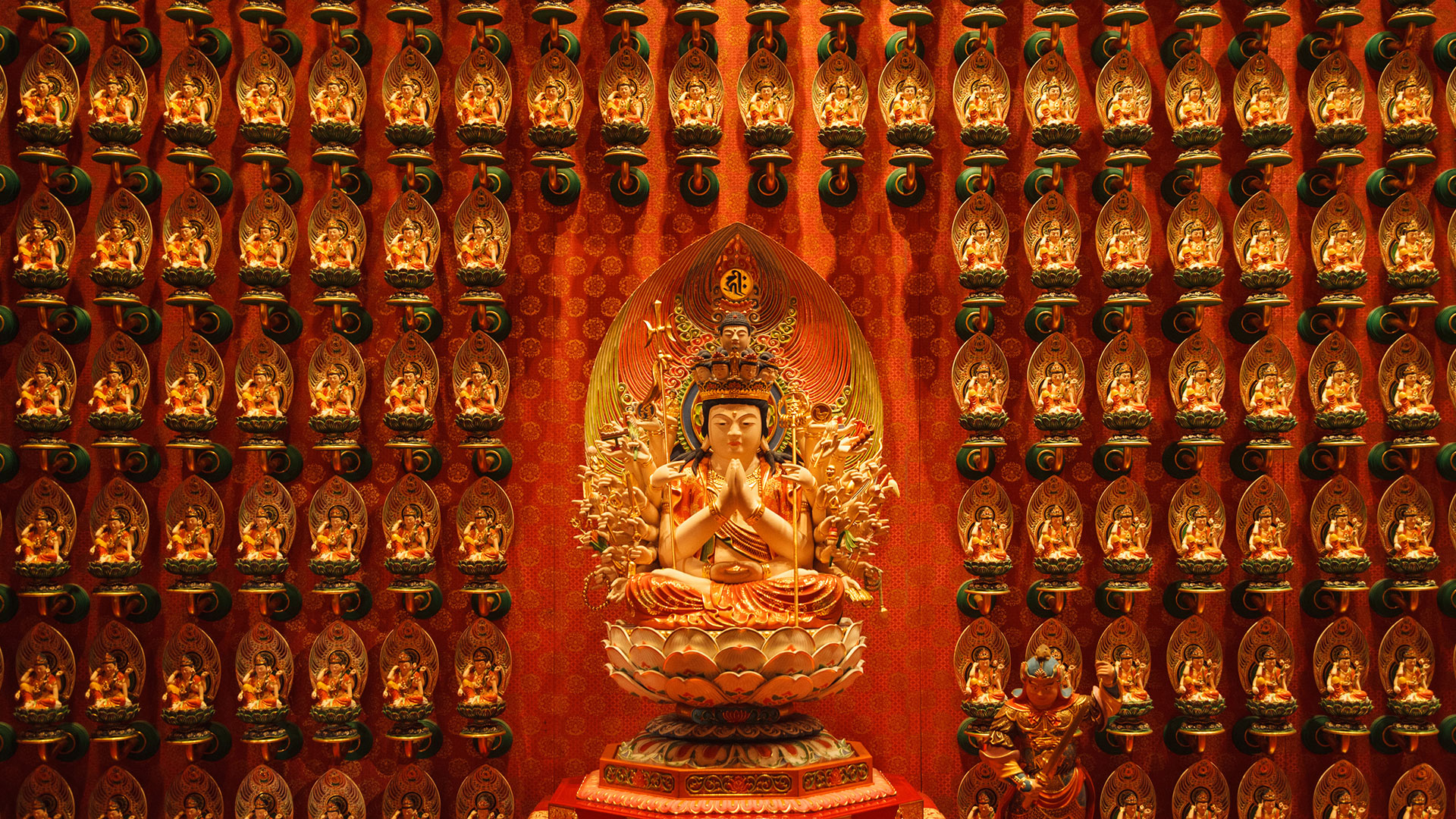 Today fortune telling is more than an ancient religious practice; it’s a multi-million dollar a year business in Taiwan. People look to fortune telling for answers concerning a wide variety of life events: a loved one’s illness, starting a new business, passing college entrance exams, when to get married, whether their unborn child will be healthy and successful. From morning to evening around the country, divination blocks are thrown, fortunes are drawn and deciphered, and offerings are made in the hopes of a favorable outcome being revealed.
Today fortune telling is more than an ancient religious practice; it’s a multi-million dollar a year business in Taiwan. People look to fortune telling for answers concerning a wide variety of life events: a loved one’s illness, starting a new business, passing college entrance exams, when to get married, whether their unborn child will be healthy and successful. From morning to evening around the country, divination blocks are thrown, fortunes are drawn and deciphered, and offerings are made in the hopes of a favorable outcome being revealed.
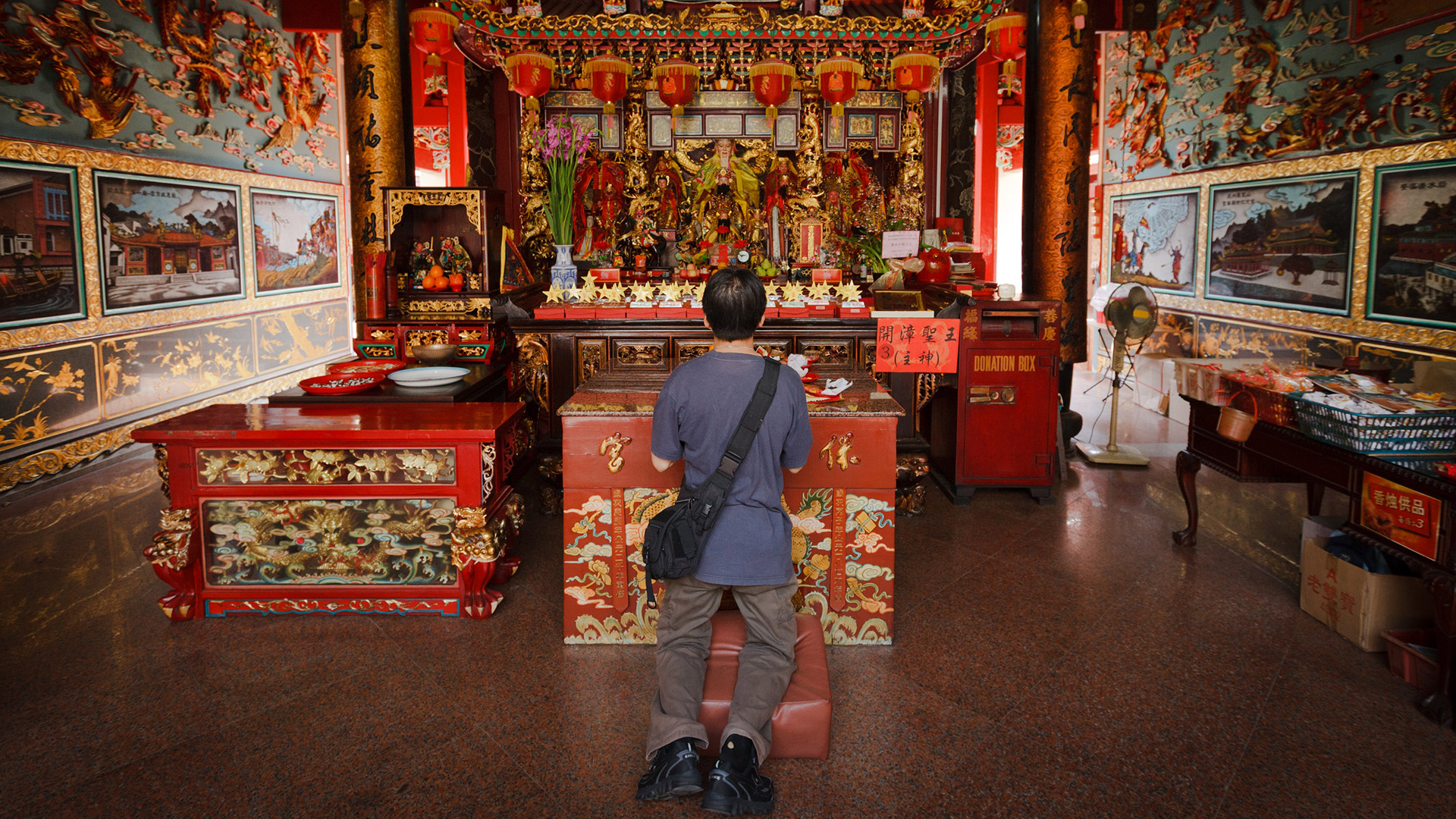 Fortune telling is found in many venues—night markets, small lanes dedicated to the practice, and private businesses. It’s commonly seen in temples of different religious backgrounds around the island as well. Before seeking their fortunes, temple attendees first participate in specific religious rites, such as purchasing and burning incense as an offering to the gods or spirits honored at that particular temple.
Fortune telling is found in many venues—night markets, small lanes dedicated to the practice, and private businesses. It’s commonly seen in temples of different religious backgrounds around the island as well. Before seeking their fortunes, temple attendees first participate in specific religious rites, such as purchasing and burning incense as an offering to the gods or spirits honored at that particular temple.
“I used to follow the advice of a fortune teller. He believed he was helping people, but all I felt was fear.”
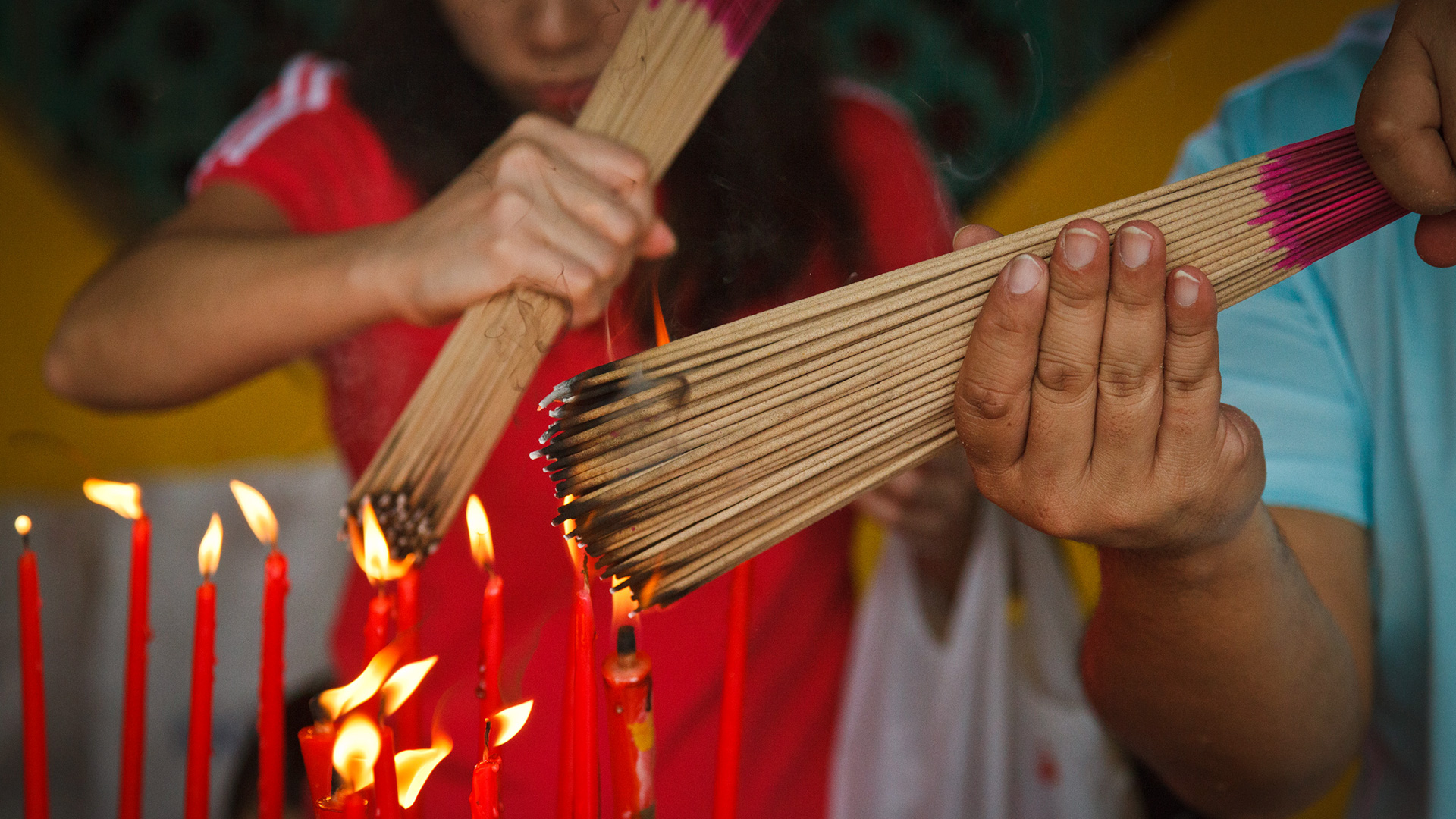 The Tools of the Fortune Telling Trade
The Tools of the Fortune Telling Trade
At most temples, incense sticks are placed in a burner as a means gaining the attention of the gods and honoring them. When worshipers light incense, they formally introduce themselves to the god, giving their name, lunar birth date and time of birth, and the address where they sleep at night. It is not assumed that the gods of the temple know the worshiper. There is no concept of a personal relationship between the worshiper and the deity.
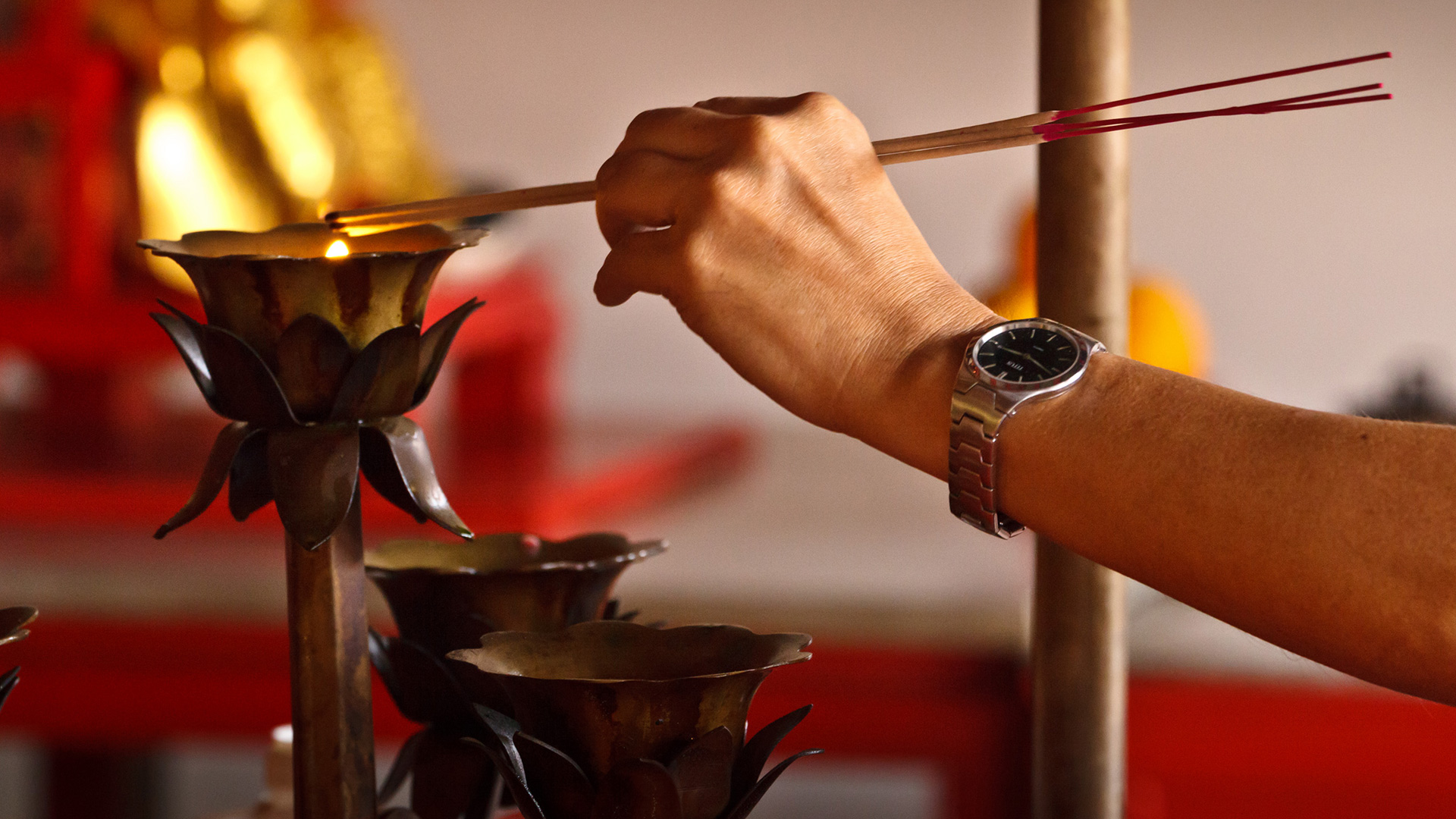 Offering incense is believed to increase the chances that prayers will be heard and answered.
Offering incense is believed to increase the chances that prayers will be heard and answered.
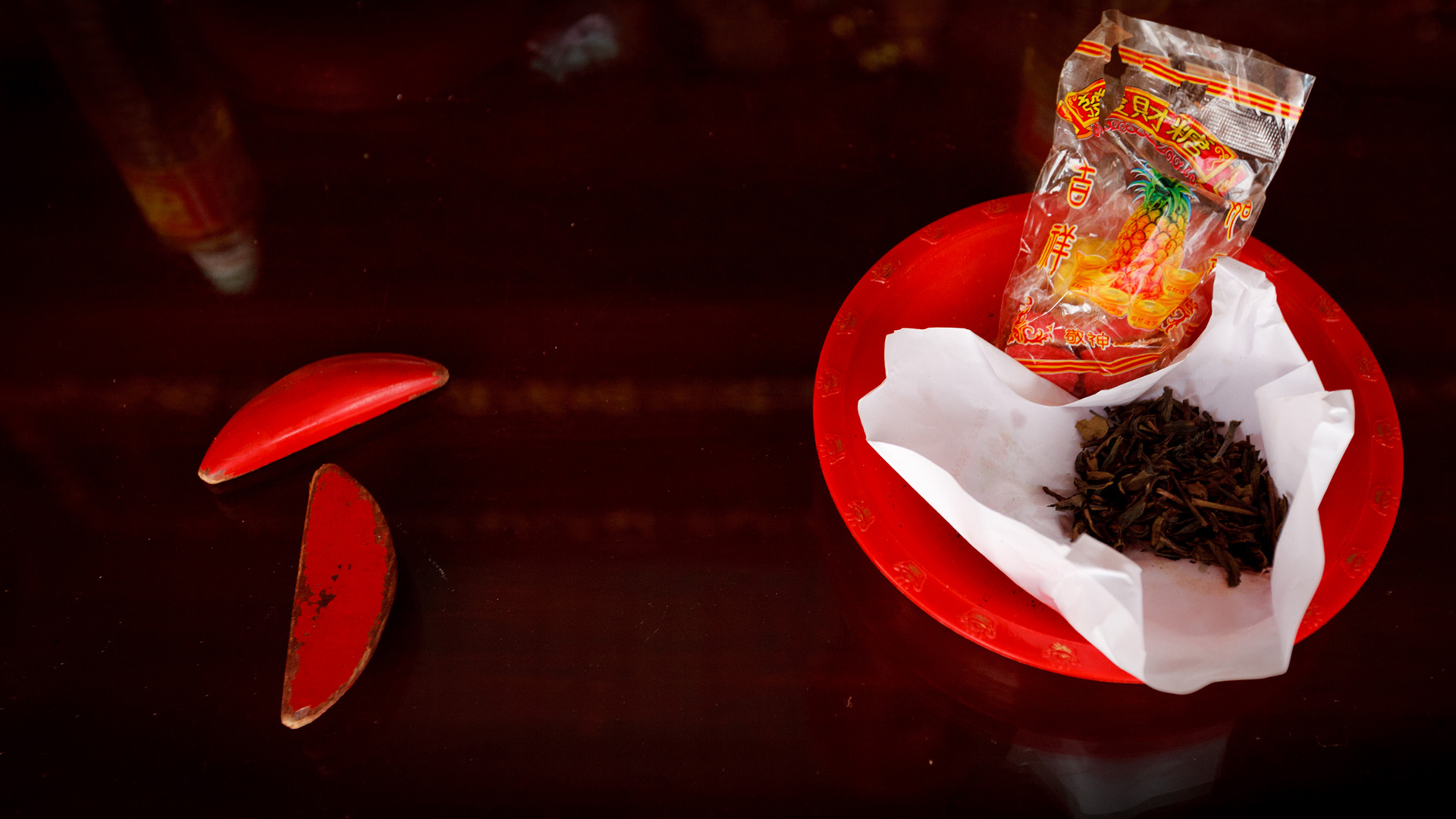 Offerings of food and drinks are also commonly given to the gods of the temple. Here, a small offering can be seen next to a set of wooden divination blocks. There are many ways fortunes may be sought or read: rice divination (in which the grain of rice you choose from a bowl reveals something about your future), bird divination (in which a trained bird chooses cards from a deck), face or palm reading, and numerology are just a few services offered. Tarot cards and crystal balls are part of some fortune tellers’ repertoires.
Offerings of food and drinks are also commonly given to the gods of the temple. Here, a small offering can be seen next to a set of wooden divination blocks. There are many ways fortunes may be sought or read: rice divination (in which the grain of rice you choose from a bowl reveals something about your future), bird divination (in which a trained bird chooses cards from a deck), face or palm reading, and numerology are just a few services offered. Tarot cards and crystal balls are part of some fortune tellers’ repertoires.
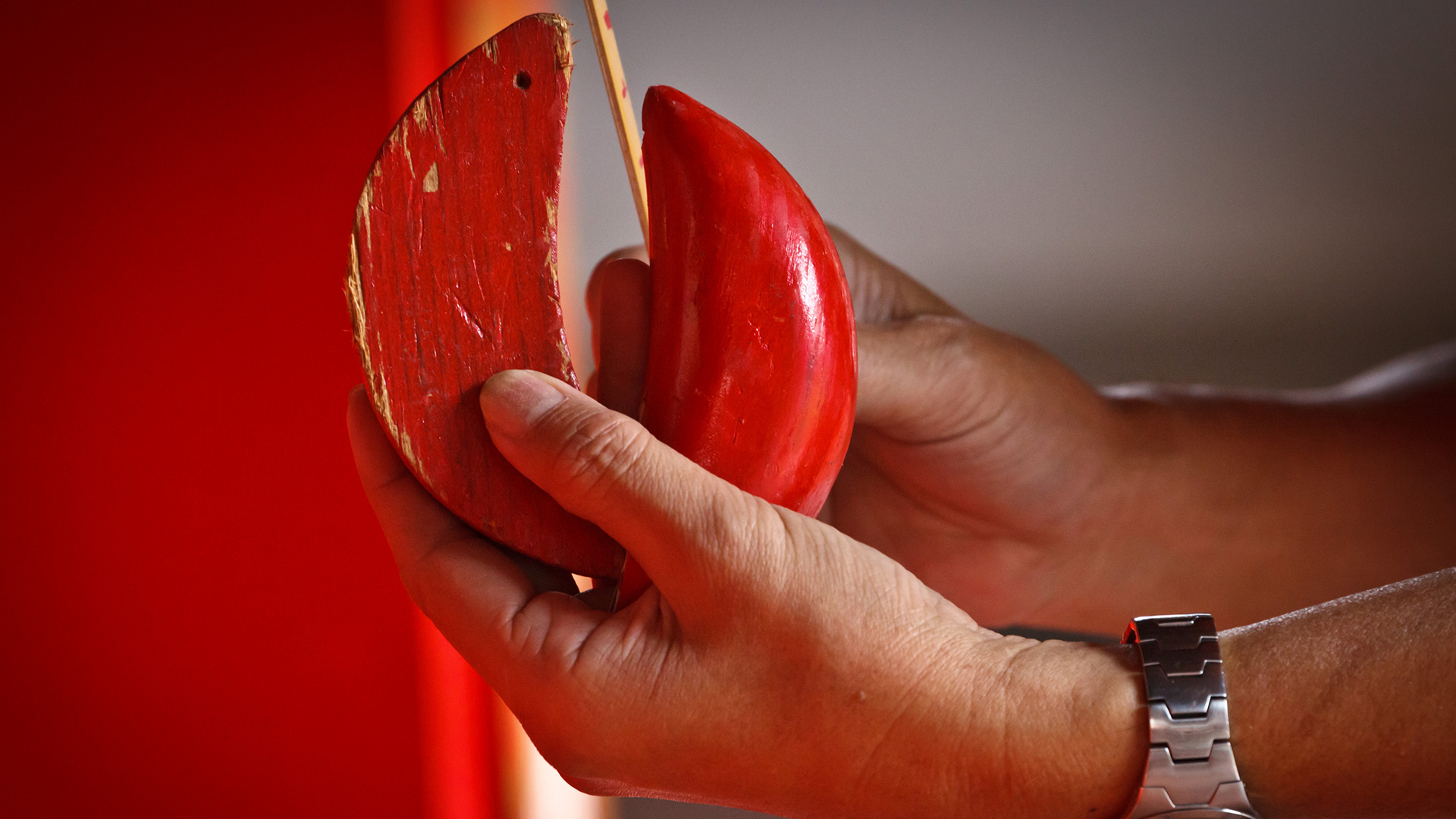 Divination blocks like these are a common fortune-telling tool as they are easy to use and do not require the assistance of a fortune teller. The user asks a series of yes or no questions before one of the temple gods, throwing the blocks down after each question. The way in which the wooden blocks fall determines the answer from the god, but the blocks can be thrown again and again in hopes of a more desirable fortune.
Divination blocks like these are a common fortune-telling tool as they are easy to use and do not require the assistance of a fortune teller. The user asks a series of yes or no questions before one of the temple gods, throwing the blocks down after each question. The way in which the wooden blocks fall determines the answer from the god, but the blocks can be thrown again and again in hopes of a more desirable fortune.
 Drawing sticks is another way of seeking answers about the future and is considered one of the oldest fortune telling methods in the world. A bamboo container is shaken up and down, causing one stick to slide up above the others. The number written on that stick correlates to a particular fortune taken from ancient texts. These fortunes aren’t specific but are usually short poems or rhymes that indicate possible outcomes or offer general spiritual guidance.
Drawing sticks is another way of seeking answers about the future and is considered one of the oldest fortune telling methods in the world. A bamboo container is shaken up and down, causing one stick to slide up above the others. The number written on that stick correlates to a particular fortune taken from ancient texts. These fortunes aren’t specific but are usually short poems or rhymes that indicate possible outcomes or offer general spiritual guidance.
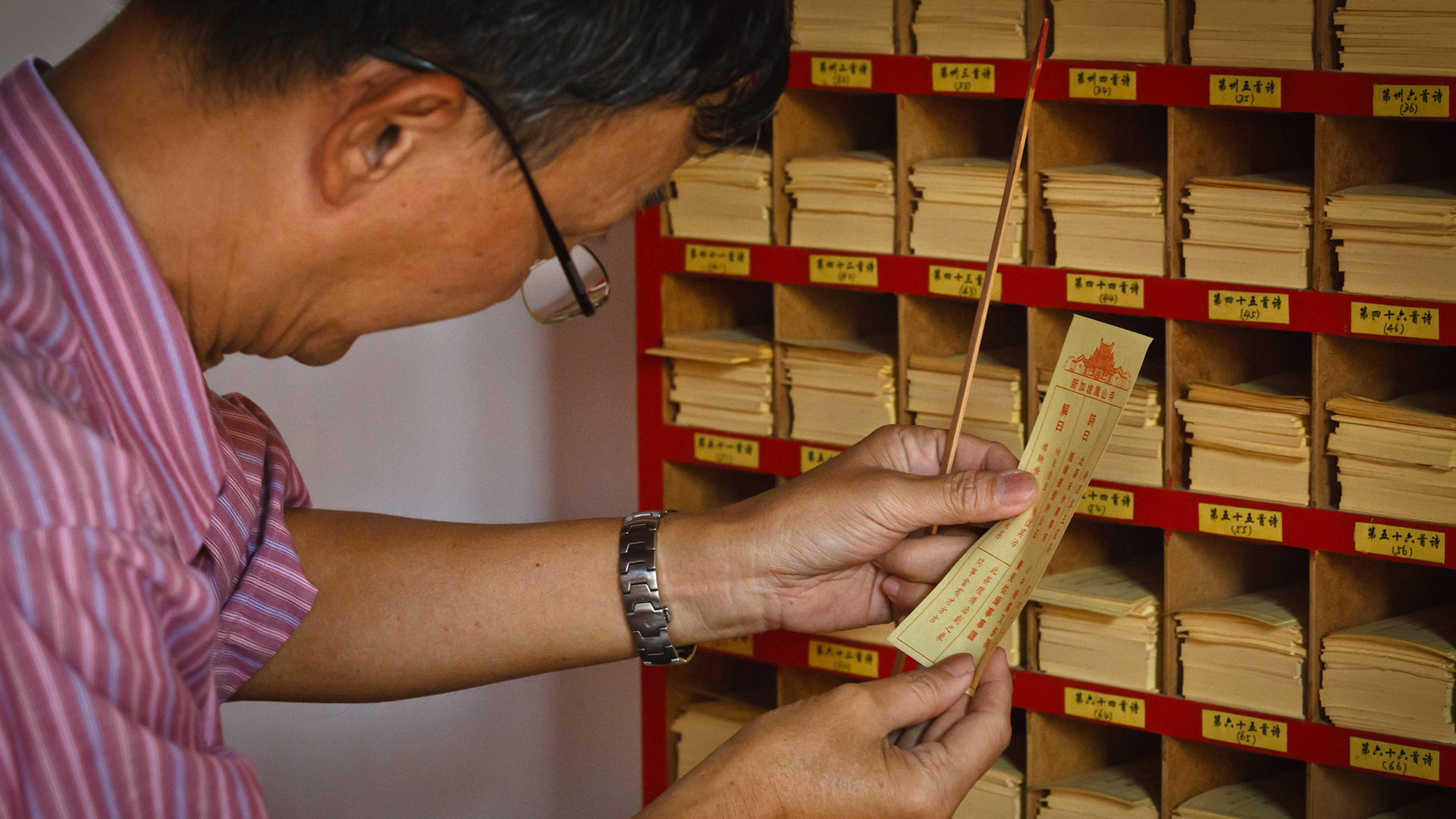 The stick is taken to a window or table, and the number on the stick is matched to the appropriate printed fortune.
The stick is taken to a window or table, and the number on the stick is matched to the appropriate printed fortune.
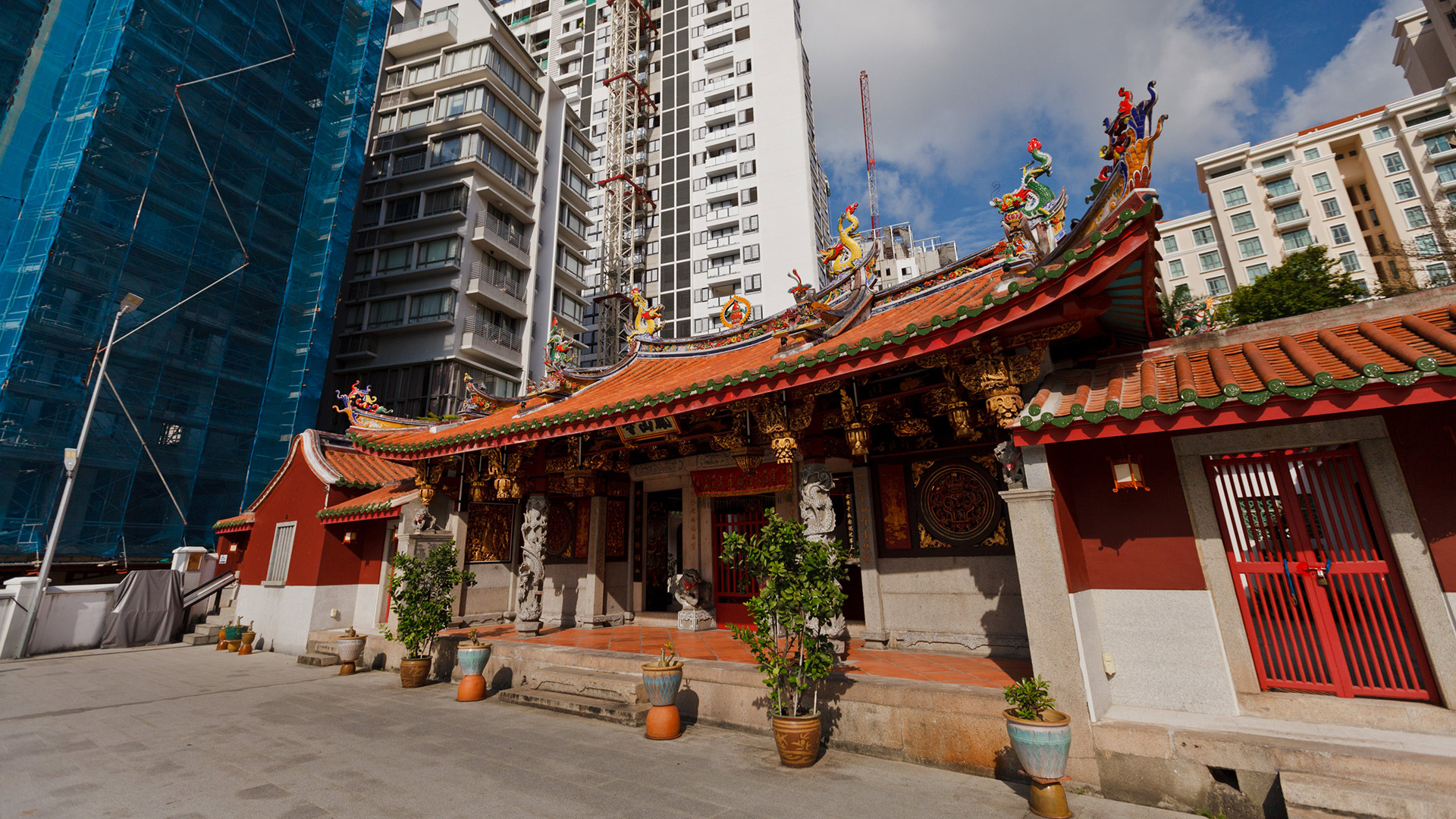 Ancient Practices Thrive in the Shadow of a Modernity
Ancient Practices Thrive in the Shadow of a Modernity
Taiwan has rapidly modernized and urbanized over the last generation. Yet ancient religious practices have held steady and have even seen a resurgence in recent years among some city dwellers. Even though adherence to traditional religious rites has endured and grown, the spiritual emptiness and fears that prompt hearts toward fortune telling have not waned.
Seeking the advice and help of spirits or idols who do not—who cannot—know you and love you personally does not fill the spiritual void inside every soul.
Remember my friend who consulted the fortune teller when her dad was sick? She later became a Christian. Freedom from the bondage of fortune telling has become a part of her testimony. “Before I was a Christian,” she says, “I used to follow the advice of a fortune teller. He believed he was helping people, but all I felt was fear. There was no hope and no assurance that following his guidance would really help me or those I loved. As soon as I started praying to Jesus instead, I felt a peace I hadn’t known before. I knew that I didn’t need to fear the future anymore.”
Pray
Pray that people in Taiwan who know Christ—the one true God, who does not live in temples made by human hands—will communicate to those around them that there is a God who truly sees them. Jesus knows their names, who they really are, and what they need before they even speak the words. He has plans for them, and his perfect love drives out all fear.
Kate Harper serves in East Asia with her husband and three sons. They enjoy hiking, drinking lots of local tea, and telling the people in their community about God’s goodness.

